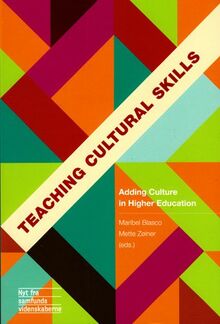
A 'cultural' dimension is today increasingly taught at universities as a supplement to disciplines that have not traditionally paid much attention to culture. Universities are competing to produce graduates with a 'global mindset' who are well equipped to cope in multicultural, team-oriented workplaces. Yet the way in which culture is taught is bound to differ de-pending on the context in which teaching takes place. Current research on teaching cultural skills tends to favour a social con-structivist approach where actors are seen as constructing collective means of sense-making in the arenas and groups in which they partici-pate. Teachers, who are often very keen to promote tolerance, empathy and intercultural dialogue, often support such an approach, but it can be a challenge to transfer this to teaching, especially in interdisciplinary con-texts. This book explores these challenges based on experiences from Danish universities, but its broader themes make it highly relevant for teachers of culture elsewhere. These themes include the globalisation of labour markets and trade, immigration which have led to increased aware-ness of the need for cultural skills; and the internationalisation of higher education which has made classrooms more multicultural than ever before.